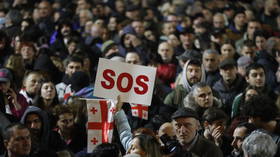EU questions democracy if liberals lose – member state’s FM
Hungary and Georgia have faced the same criticism from Brussels, Peter Szijjarto has said
The EU would not be questioning the Georgian elections had the liberals won, Hungarian Foreign Minister Peter Szijjarto has told RT Arabic.
The ruling Georgian Dream party won 54% of the parliamentary votes in last Saturday’s election, but Brussels has sided with opposition parties that are claiming the contest was rigged.
“I understand that this is against the will of Brussels. This is against the intention of the liberals,” Szijjarto told RT Arabic on the sidelines of a security meeting in Minsk on Thursday.
“The Georgian Dream party is a sovereignist party, is a conservative party, is a pro-peace and pro-family party, so absolutely far away from [the] liberal mainstream,” he added.
“In case there’s a sovereignist conservative party to win the election, immediately the democratic nature of that given political system is being questioned. If the opposition parties had won, now you’d hear from Brussels that the democracy in Georgia is fantastic,” the Hungarian diplomat told RT.
Hungary’s ruling Fidesz party has faced similar criticism from the EU over the past 14 years, Szijjarto noted, describing it as “nothing new under the sun.”
Georgian Dream made building pragmatic relations with all neighbors, including Russia, a pillar of their campaign. Four opposition parties, including the one brought to power by a US-backed ‘color revolution’ in 2003, accused the government of “stealing” the election. Georgia’s president, the French-born Salome Zourabichvili, has sided with the opposition but failed to offer any evidence for the alleged irregularities, arguing that her feeling about it being a “Russian operation” is good enough.
Hungary currently presides over the EU Council. Prime Minister Viktor Orban visited Tbilisi earlier this week to congratulate Georgian Dream, only to be denounced by 13 member states of the bloc who sided with the opposition.
Orban has pointed to televised exchanges in the European Parliament to accuse some EU leadership figures of plotting a “regime change” in Budapest so as to get rid of a government that does not toe the line.
Szijjarto was in Belarus for the 2nd Minsk International Conference on Eurasian Security. He also met with Russian Foreign Minister Sergey Lavrov, to discuss a wide range of bilateral issues and follow up on the July meeting between Orban and Russian President Vladimir Putin in Moscow.






Comments are closed.